#worldbuilding resources
Text
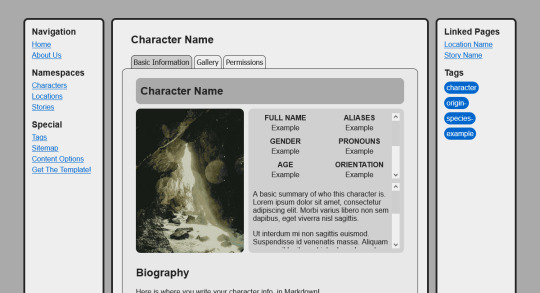
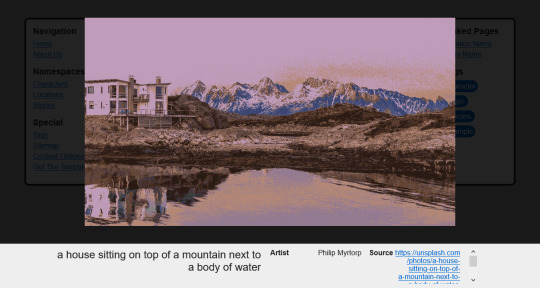
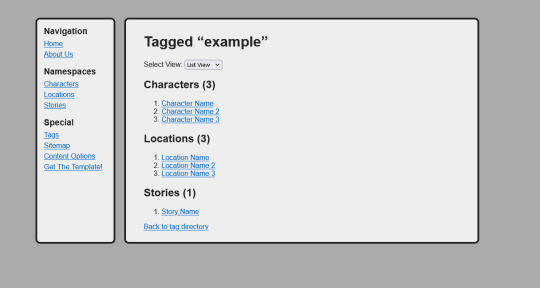
portfiend's oc directory template
three weeks ago i began work on a little Eleventy-based website template for storing character information akin to Toyhou.se. it's been in a releasable state for about a week, but i've also been pushing updates to it near daily!
i also wrote up a quick tutorial for setting up the project on its download page, but i plan to improve it in the future.
click here to preview this template: NeoCities
click here to get the code: GitHub
features:
built-in "namespaces" for characters, locations, and stories, with their own page templates and information card formats
uses eleventy's tagging system to allow you to tag pages for fine categorization
a big focus on linking to other pages. each "creative" page lets you navigate between the previous/next item in the category. pages have a "linked pages" list that allow you to navigate to related pages, including "what links here"
a content filtering system allowing developers to hide/blur certain content from people who have not opted into it. optionally supports needing to click an "i am 18+" box before entering the site
lightbox images; clickable image links that can reveal metadata such as captions and artist credits
tabbed views allow you to view specific sections of content at a time, used in the various creative pages
SASS wrapper for optional better-formatted stylesheets. don't know how to use SASS syntax? SASS also supports regular CSS!
this project is licensed under MIT License.
#neocities#neocities template#website template#web resources#webdev#indie web#indieweb#character directory#original character#worldbuilding#worldbuilding resources
263 notes
·
View notes
Text
For all you worldbuilders out there, I don't know if you know, but r/worldbuilding on Reddit made this Google Doc with a ton of resources they gathered. Thought that might help some of you.
2K notes
·
View notes
Text
Learning Modern Golic Vulcan (Vulkansu)
youtube
Primary Resources
Kir'Shara: Vulcan Language Page
Offers a Wayback Machine link to the Vulcan Language Dictionary and the basics of Vulcan word, tense, and grammatical structure.
*Vulcan Language Dictionary
Not the same as the VLD provided by Kir'Shara's Wayback Machine, rudimentary search engine to quickly find Vulkansu translations to english words and storehouses specific Vulcan cultural references that cannot be translated into an English word.
Vulcan Language Institute
A website in development by @yel-halansu among other contributors to composite a very large index of Vulcan languages (including dialects), words, and Vulcan stories in both English & Vulkansu.
The Vulcan Language PDF
A somewhat outdated but still useful Vulkansu dictionary, primarily helpful for the language lessons in the latter half.
Kor'saya: Vulkansu Script
Lore on the development of the ancient script, there are other fonts like “handwriting” and “Dzhaleyl” but AGV (Ancient Golic Vulcan) is the one which contains the letter-by-letter breakdown.
Vulcan Alphabet Song
A rudimentary children's song "ghost written" by Amanda Grayson on the absolute basics of the Vulcan alphabet from consonants, to vowels, punctuation, self-identification, to digits. (Hopefully I will be able to put it to music soon instead of just lyrics!)
Names
City Names
Monastery Names
Name Prefixes & Suffixes
Translations for the apostrophes and hyphens in Vulcan names.
Vulcan Name Repository
A glossary of Vulcan names and their meanings. Explanations for types of names in Vulcan culture:
Place of Origin ~ Ancestry ~ te-Vikram (the Deep Desert Tribe) ~ Childhood Names ~ Personality ~ Occupation ~ Survival ~ Mysticism
Anecdotes & Ancillary Material
Vulcan Alphabet Song
A rudimentary children's song "ghost written" by Amanda Grayson on the absolute basics of the Vulcan alphabet from consonants, to vowels, punctuation, self-identification, to digits. (Hopefully I will be able to put it to music soon instead of just lyrics!)
Vulcan Flashcards
Beautifully designed flashcards for the Vulkansu alphabet from A through T in the phonetic alphabet.
The Vulcan Accent
What does a Vulcan accent sound like in Federation Standard? Question posited by @sporkandpringles, answer provided by @nuclear-wessels!
The Origin of "Fool"
Anecdote provided by @porthos-stew and lore provided by @yel-halansu
Vulcan Colloquialisms
Though logical only in specific contexts, @makeallthingsyours has accrued a handful of common Vulcan expressions and translated them into Federation Standard
Click Here to Return to the Vulcan Masterpost (Coming Soon!)
#Youtube#star trek#Vulcans#vulcan#vulcantology#t'khasi#conlang#constructed language#vulkansu#vulkansu-tal#star trek vulcans#star trek memory beta#star trek novels#kir'shara#korsaya#vulcan dictionary#vulcan language institute#worldbuilding resources#lore resources#vulcan culture#vulcan headcanons#vulcan masterpost v.3
109 notes
·
View notes
Text
To anyone out there interested in Worldbuilding, I'd like to give a shout out to A Collection Of Unmitigated Pedantry.
As I'm gradually grinding away at my attempt to make a Worldbuilding Advice blog, I have found ACOUP to be a fount of knowledge in both the subject matter I cover at @archsarmedadvice , and in the whole craft of delivering insightful yet approachable advice. I just hope AAA might even approach such heights one day.
7 notes
·
View notes
Text
Amazing Names for Your Stories, Worldbuilding, and Pretty Much Everything
I feel like somewhere on this site, someone has to have posted about this, but I haven't come across it yet, so here we go:
I'm not sure about everyone else, but for me, coming up with names is, by far, the most difficult thing about creating anything.
Years ago, I found the most amazing website with over 1200 name generators. It has names for, and I'm not exaggerating here, EVERYTHING.
Names for fantasy characters of any species? Done.
Names from specific origins and time periods? Yup.
Names for towns, cities, spells, plants, books, new species, councils, countries, or online usernames? Here ya go.
It even has a section where you can find names suitable for most pop-culture fandoms. Like, there are name generators in there specifically for Weeping Angels from Doctor Who, all the way up to names for your Minecraft dog.
There are even description generators, if you're completely stuck trying to find a good description for a character, or just need to see one written out to get your creative ideas flowing.
All names and resources are submitted by fans of the site and are completely free to use; it also adds new generators all the time. Whether you're looking for a name or just inspiration, you'll probably find it there.
On its sister website, there are things like flag creators, map makers, town creators, a combat and initiative tracker, and even family tree and language generators.
The site's called Fantasy Name Generators, and you can find it here:
And here's the sister website, where you can find a bunch of tools for DnD-type games or just worldbuilding in general:
#name generator#creative writing#writing#roleplay#fantasy#original character#rp resources#writing resources#dnd#creative inspiration#inspiration#worldbuilding#worldbuilding resources#help with writing
9 notes
·
View notes
Text
Something interesting I just found looking around on Google:
"Additionally, Olson was surprised to find that an increase in salinity—the amount of salt dissolved in our ocean—can dramatically affect the Earth’s climate. Her model found that if we were to double the amount of salt in our ocean, it would cause all sea ice to melt and lead to 6 degrees Celsius warming of the planet." - From here.
Here's a link to the original paper.
Really brings home how complicated and interconnected nature is.
2 notes
·
View notes
Text
Fantasy Guide to Building A Culture

Culture is defined by a collection of morals, ethics, traditions, customs and behaviours shared by a group of people.
Hierarchy and Social Structures

Within every culture, there is a hierarchy. Hierarchies are an important part of any culture, usually do ingrained that one within the culture wouldn't even question it. Hierarchy can be established either by age, gender or wealth and could even determine roles within their society. Sometimes hierarchy can may be oppressive and rigid whilst other times, ranks can intermingle without trouble. You should consider how these different ranks interact with one another and whether there are any special gestures or acts of deference one must pay to those higher than them. For example, the Khasi people of Meghalaya (Northern India), are strictly matrillineal. Women run the households, inheritance runs through the female line, and the men of the culture typically defer to their mothers and wives. Here are a few questions to consider:
How is a leader determined within the culture as a whole and the family unit?
Is the culture matriarchal? Patriarchal? Or does gender even matter?
How would one recognise the different ranks?
How would one act around somebody higher ranking? How would somebody he expected to act around somebody lower ranking?
Can one move socially? If not, why? If so, how?
Traditions and Customs

Traditions are a staple in any culture. These can be gestures or living life a certain way or to the way a certain person should look. Traditions are a personal detail to culture, they are what make it important. Tradition can dictate how one should keep their home, run their family, take care of their appearance, act in public and even determine relationship. Tradition can also be a double edged sword. Traditions can also be restrictive and allow a culture to push away a former member if they do not adhere to them, eg Traditional expectations of chastity led to thousands of Irish women being imprisoned at the Magdelene Laundries. Customs could be anything from how one treats another, to how they greet someone.
How important is tradition?
What are some rituals your culture undertakes?
What are some traditional values in your world? Does it effect daily life?
Are there any traditions that determine one's status?
Values and Opinions
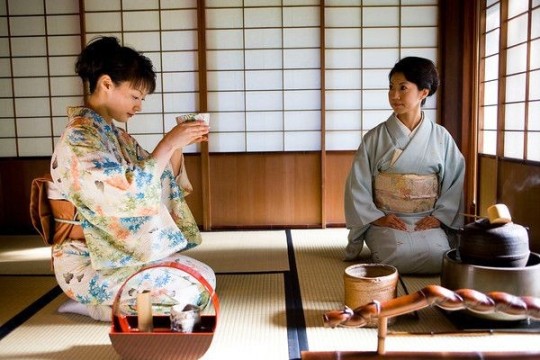
Values and Opinions are the bread and butter of any culture. This is the way your culture sees the world and how they approach different life hurdles. These may differ with other cultures and be considered odd to outsiders, what one culture may value another may not and what opinion another holds, one may not. There will be historical and traditional reasons to why these values and opinions are held. Cultures usually have a paragon to which they hold their members to, a list of characteristics that they expect one to if not adhere to then aspire to. The Yoruba people value honesty, hard work, courage and integrity. Here are some questions to consider?
How important are these ethics and core values? Could somebody be ostracised for not living up to them?
What are some morals that clash with other cultures?
What does your culture precieved to be right? Or wrong?
What are some opinions that are considered to be taboo in your culture? Why?
Dress Code

For many cultures, the way somebody dresses can be important. History and ethics can effect how one is meant to be dressed such as an expectation of chastity, can impose strict modesty. While other cultures, put more importance on details, the different sorts of clothes worn and when or what colour one might wear. The Palestinian people (من النهر إلى البحر ، قد يكونون أحرارا) denoted different family ties, marriage status and wealth by the embroidery and detailing on their thoub.
Are there traditional clothes for your world? Are they something somebody wears on a daily basis or just on occasion?
Are there any rules around what people can wear?
What would be considered formal dress? Casual dress?
What would happen if somebody wore the wrong clothes to an event?
Language

Language can also be ingrained as part of a Culture. It can be a specific way one speaks or a an entirely different language. For example, in the Southern States of America, one can engage in a sort of double talk, saying something that sounds sweet whilst delivering something pointed. Bless their heart. I have a post on creating your own language here.
Arts, Music and Craft

Many cultures are known for different styles of dance, their artwork and crafts. Art is a great part of culture, a way for people to express themselves and their culture in art form. Dance can be an integral part of culture, such as céilí dance in Ireland or the Polka in the Czech Republic. Handicrafts could also be important in culture, such as knitting in Scottish culture and Hebron glass in Palestine. Music is also close to culture, from traditional kinds of singing such as the White Voice in Ukraine and the playing of certain instruments such as the mvet.
Food and Diet

The way a culture prepares or intakes or treats certain foods are important to a culture. In some cultures, there is a diet yo adhere to, certain foods are completely banned. With Jewish culture, pork is prohibited along with fish such as sturgeon, along with shellfish and certain fowl. Meat must also be prepared in a certain way and animal byproducts such as dairy, must never be created or even eaten around this meat. This is known as kosher. The way one consumes food is also important to culture. In some cultures, only certain people may eat together. Some cultures place important on how food is eaten. In Nigerian culture, the oldest guests are served first usually the men before the women. In Japanese culture, one must say 'itadakimasu' (I recieve) before eating. Culture may also include fasting, periods of time one doesn't intake food for a specific reason.
What are some traditional dishes in your world?
What would be a basic diet for the common man?
What's considered a delicacy?
Is there a societal difference in diet? What are the factors that effect diet between classes?
Is there any influence from other cuisines? If not, why not? If so, to what extent?
What would a typical breakfast contain?
What meals are served during the day?
What's considered a comfort food or drink?
Are there any restrictions on who can eat what or when?
Are there any banned foods?
What stance does your world take on alcohol? Is it legal? Can anybody consume it?
Are there any dining customs? Are traditions?
Is there a difference in formal meals or casual meals? If so, what's involved?
Are there any gestures or actions unacceptable at the dinner table?
How are guests treated at meals? If they are given deference, how so?
#Fantasy Guide to Building A Culture#As promised#If I fail my German exam I'm blaming ye#Culture#Building a culture#Fantasy Guide#WorldBuilding#WorldBuilding guide#WorldBuilding help#Writing help#writing#writeblr#writing resources#writing reference#writing advice#ask answered questions#writers#writing advice writing resources#spilled ink#ask answered
8K notes
·
View notes
Text
A Workshop for Creating Magical/ Fictional Crystals: A Guide from a Geologist
Hi folks, its me, here to talk about fictional writing again! Today I'm just tackling the idea of magical stones/mana stones by looking at existing minerals today and some neat properties that they have, and how you can apply these things to a fictional world. The goal is mainly to help you if you are stuck trying to come up with a unique magic system, or a unique identification/characteristic of your mineral.
First Things First: Mineral Shapes

I am exhausted, petered out, down-right fatigued by seeing every mineral depicted with having the crystal structure of calcite and quartz. There are soooooo many cooler, more interesting crystal structures, don't you think you would stop and take a look at a perfect cube in nature? It is completely unsettling.
Second: Color
Color within minerals can either be really important, or not important at all! It is your choice to decide if color is going to be something that means something to your mineral. But what are some times when the color is important? Well.... there are some elements that are called chromophores, this classification just indicates that these elements, when present, will determine the color of whatever they are in. So, if you wanted to treat mana like a chromophore, you could say, "Oh everything that contains mana turns green!" This could mean that regardless of the mineral, if that mineral is a specific color, it means it contains mana. This concept is exciting because you can just stop here and use minerals that already exist! You can also use it as an indicator for a magical ore! Chromophores are typically metals, so if you are making a new metal weapon, making the ore of that metal a unique color would make a lot of sense!
However, your mineral can also just be every color of the rainbow like quartz and perhaps that's what makes identifying your mana stones elusive and create an illusion of scarcity that your character can solve.

There are other things that can change the colors of minerals, like radiation damage, and electron exchange, but I think that is beyond what would be helpful! So lets talk about some unique color properties that happen in nature that seem magical in the first place! Maybe you don't need to design a mana stone, but you want a unique gemstone that only the royal family passes down or something (IDK).
The first one is the alexandrite effect! This is where a mineral can change color in natural light vs. incandescent light. (the mineral itself is not changing, but the lights contain different amounts of different colors that then get absorbed by the stone). Even if you don't use electricity in your fictional world, you could have the colors change in the presence of light magic. This could create fun misunderstandings about what the mineral is reacting to!
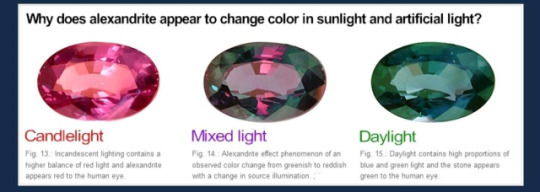
Pleochroism
Pleochroism is something that most minerals have, it is frequently used to help identify minerals in thin sections, however minerals are usually not pleochroic enough for it to be visible to the naked eye! Pleochroism is just a fancy name to describe the change in how light is absorbed based on the angle of the mineral! So if you scroll up to the first image where I showed a lot of crystal shapes, most of them have angles where they are longer and shorter! This will effect the way light travels in the crystal. Tanzanite is a popular mineral that does this.

Photochromism
This is when a mineral will change color (in a reversible way) when exposed to UV light (or sunlight), I am not going to go too into the details of why this is happening because it would require me to read some research papers and I just don't feel like it. The mineral that is best known for this is Hackmanite!
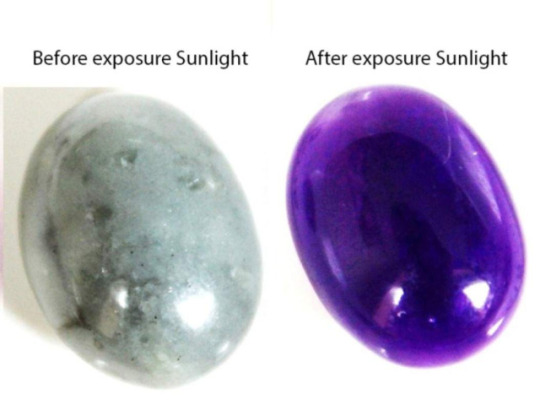
Alright! These are all the really cool color effects that might inspire you or maybe not, but now I am going to talk about how you might find your minerals within a rock!
When I see a lot of magical caves/mines, typically I see them with some variation of a geode honestly, but most minerals are not found like that! Now I am sure most of you guys have seen a geode, so I will not really talk about those, but I will talk briefly about porphyroblasts which is when the mineral grows larger than the minerals around it, this happens in metamorphic minerals!

sorry random stranger, but this is an image of garnets inside a finer-grained rock at gore mountain in New York!
Another way you might find minerals is in a pegmatite! This is when all minerals are really large! This is a formed from really slow crystalizing magma!
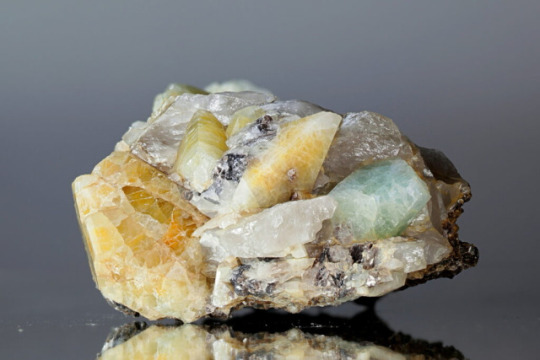
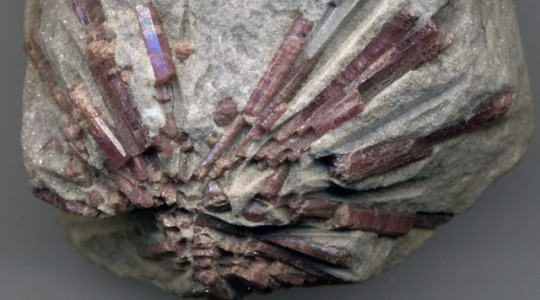
But something else to think about is that your mineral might just be massive, it doesn't have to have distinct crystals, it may be similar to jadeite where small grains grow together which leaves it looking smooth and seamless! A note about all of these is that you would have to mine into the rock to find these, there would not be any natural caves in these rocks! Caves are only ever really formed in limestones and maybe marbles (rocks that react with acid).
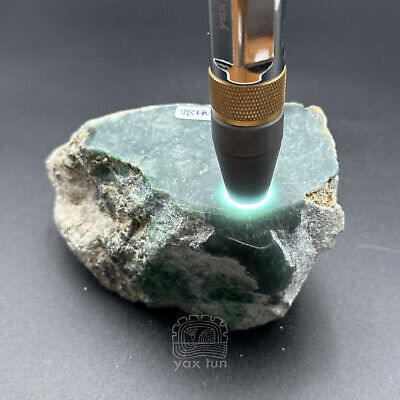
How can your characters identify these minerals?
Typically when you are out in the field you will look to see what type of rocks the minerals are found in (The overall texture of the rock will tell you how it formed). If you know how the rock formed, it will narrow down the amount of minerals you need to think about by quite a bit! Next, you are going to look closely at it and observe its crystal structure, does it have an obvious crystal? if so what is the general shape? If it is broken, how did it break? Did it fracture like glass or did it break along uniform planes. Some minerals have a thing called cleavage (breaks along planes of weakness). If a mineral exhibits this habit, it will again help narrow this down. Next we can look at color. Color can be misleading, because minerals like quartz can be any color imaginable, but minerals like olivine will always be green! The next thing your character can do is test for hardness, minerals all have a specific hardness that can help identify it as well.
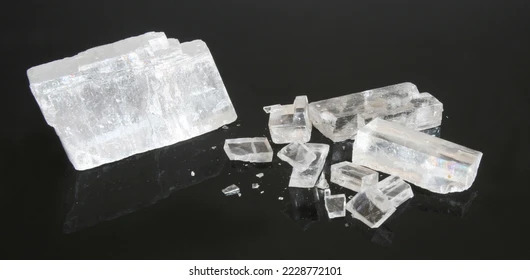
After you go through all of this, your mineral might have some special property! This could be magnetism, fluorescence, reactions to acid, or any of the color changing effects I mentioned above! Other than that, your character can take it back to a lab and do a number of things to identify it, but the most typical thing would be for them to make a thin section (very thin piece of the rock) and observe it under a cross polarized microscope!

On that note folks! I hope this helped in some way in thinking of new magic mineral properties! I have other guides that explore some different fictional worldbuilding issues you might run into, but if you have any topics you would like me to cover please that I haven't mentioned already, let me know!
#geology#rocks#creative writing#fictional world#worldbuilding#dnd#dnd worldbuilding#worldbuilding stuff#writing resources#info post#information#writing
4K notes
·
View notes
Text
a list of 100+ buildings to put in your fantasy town
academy
adventurer's guild
alchemist
apiary
apothecary
aquarium
armory
art gallery
bakery
bank
barber
barracks
bathhouse
blacksmith
boathouse
book store
bookbinder
botanical garden
brothel
butcher
carpenter
cartographer
casino
castle
cobbler
coffee shop
council chamber
court house
crypt for the noble family
dentist
distillery
docks
dovecot
dyer
embassy
farmer's market
fighting pit
fishmonger
fortune teller
gallows
gatehouse
general store
graveyard
greenhouses
guard post
guildhall
gymnasium
haberdashery
haunted house
hedge maze
herbalist
hospice
hospital
house for sale
inn
jail
jeweller
leatherworker
library
locksmith
mail courier
manor house
market
mayor's house
monastery
morgue
museum
music shop
observatory
orchard
orphanage
outhouse
paper maker
pawn shop
pet shop
potion shop
potter
printmaker
quest board
residence
restricted zone
sawmill
school
scribe
sewer entrance
sheriff's office
shrine
silversmith
spa
speakeasy
spice merchant
sports stadium
stables
street market
tailor
tannery
tavern
tax collector
tea house
temple
textile shop
theatre
thieves guild
thrift store
tinker's workshop
town crier post
town square
townhall
toy store
trinket shop
warehouse
watchtower
water mill
weaver
well
wind mill
wishing well
wizard tower
#worldbuilding#setting prompts#writer resources#writing inspiration#writing prompts#scene settings#writing reference#writing ideas#prompt list#creative writing#writing community#writer prompts#writing tips#world#fantasy world#fantasy worldbuilding#high fantasy#world building#epic fantasy#writing fantasy
2K notes
·
View notes
Text
Let's talk about worldbuilding.
Worldbuilding is a crucial aspect of writing fiction, particularly in genres like fantasy and science fiction.
Remember that worldbuilding is a dynamic process that evolves as you write. Don't be afraid to experiment and make changes to your world as needed to serve the story.
Here are some tips to help you build a rich and immersive world:
Start with a Core Concept: Every world begins with an idea. Whether it's a magic system, a futuristic society, or an alternate history, have a clear concept that serves as the foundation for your world.
Define the Rules: Establish the rules that govern your world, including its physical laws, magic systems, societal norms, and cultural practices. Consistency is key to creating a believable world.
Create a Detailed Map: Optional, but helpful. Develop a map of your world to visualise its geography, including continents, countries, cities, and landmarks. Consider factors like climate, terrain, and natural resources to make your world feel authentic.
Build a History: Develop a rich history for your world, including key events, conflicts, and historical figures. Consider how past events have shaped the present and influenced the cultures and societies within your world.
Develop Cultures and Societies: Create diverse cultures and societies within your world, each with its own beliefs, traditions, languages, and social structures. Explore how different cultures interact and conflict with one another.
Flesh Out Characters: Populate your world with memorable characters who reflect its diversity and complexity. Consider how their backgrounds, motivations, and personalities are shaped by the world around them. (See my post on character development for more!)
Consider Technology and Magic: Determine the level of technology and the presence of magic in your world, and how they impact daily life, society, and the overall narrative.
Think about Economics and Politics: Consider the economic systems, political structures, and power dynamics within your world. Explore issues like inequality, governance, and social justice to add depth to your worldbuilding.
Show, Don't Tell: Instead of dumping information on readers, reveal details about your world gradually through storytelling. Show how characters interact with their environment and incorporate worldbuilding seamlessly into the narrative.
Stay Consistent: Maintain consistency in your worldbuilding to ensure coherence and believability. Keep track of details like character names, historical events, and geographic locations to avoid contradictions.
Leave Room for Exploration: While it's essential to have a solid foundation for your world, leave room for discovery and exploration as you write. Allow your world to evolve organically and be open to new ideas and possibilities.
Revise and Edit: Carefully review your worldbuilding to identify any inconsistencies, plot holes, or contradictory elements. Pay attention to details such as character backgrounds, historical events, and the rules of your world's magic or technology. Make necessary revisions to resolve any issues and maintain the integrity of your worldbuilding.
Happy writing!
#writeblr#writing#writing tips#writing help#writing resources#writing advice#worldbuilding#fantasy worldbuilding#creative writing#deception-united
642 notes
·
View notes
Text
Curated Spotify playlists to liven up your D&D sessions!
I have always loved playing D&D with background music that fits the location, mood, or type of combat, so I created several playlists on Spotify. This project is something I've been working on since December 2019, and something I want to share with you all! You can find the list below.
If you have suggestions for songs/tracks to include, or if you want a specific playlist that is not in this list yet, please let me know! And most of all, have fun!
Locations
Astral Plane
Ball/Masquerade
Bazaar
Castle/Court
City
Desert
Dungeon
Festival
Forest
Jungle
Monastery
Mountains
Schools of the Arcane
Ship
Tavern
Temple
Town/Village
Underwater
Moods
Creepy/Eerie
Dramatic
Enchanted
Energetic/Adventurous
Heroic
Grand
Intrigue
Menacing
Mysterious
Night
Peaceful
Sad/Mourning
Silly
Tender/Emotional
Combat
Small Battle
Big Battle
Boss Battle
Tavern Brawl
Chase
Themes/settings
Ancient Greece
Bard songs
Patrons/Visions
Visions/Dreams
#dnd#dnd 5e#ttrpg#music#spotify#playlist#writing#writing inspiration#spotify playlist#d&d#dungeons and dragons#worldbuilding#dm tools#resources#reference
1K notes
·
View notes
Text
some misc worldbuilding questions to get your gears turning:
Do they have germ theory or some equivalent? How do they conceptualize the spread of disease and infection?
Is the everyday economy based more on trade/barter or currency? Is the currency valuable in its own right, or is it just something agreed upon to have value (eg. salt or gold vs. paper money)
What is their main method of lighting? What resources does this use?
Primary mode of transportation? How much does this vary based on things like purpose of travel, social class, etc.?
How much of a knowledge/education gap is there between social classes? Is there a baseline of education that everyone gets/is expected to have?
What are the most popular modes of storytelling? Is everyone telling campfire stories? Are they going to plays? puppet shows? are they going to the cinema? are they reading novels or epic poetry? Are there any folk characters or pop culture things that most people are familiar with?
Where does most people's moral framework primarily come from? Religion? Philosophy? Are there different schools of thought? How much do they vary?
Is there anything considered scandalous/improper/taboo that's normal in your own culture? and vice versa
Do most people live and die where they are born, or is it common to relocate and travel widely? how much does this vary by class/profession/region?
What do they do with criminals? Do they have an extensive prison system? If so, who funds/runs it? If not, how is crime discouraged/managed? Are there specific punishments for specific crimes?
How rigid are their class boundaries? How possible/common is it for someone to change social classes?
Is there anything that people get dangerously addicted to in your world? How accessible is it?
How easy is it for someone to do research/look up information they don't know? What is the primary method of doing this?
What holidays do they have? Any weird traditions? Fun traditions? Are they universally celebrated, or only by specific groups of people?
How do they dispose of their dead? How do they honor their dead?
How much exchange is there between cultures? Do people of different groups intermingle, or do they mostly stick with their own people?
How common is it to speak more than one language, and who is most likely to be multilingual?
How much do regional dialects/accents vary within the same language? Are there any dialects/accents that are stigmatized? Do different accents have different associated stereotypes?
This isn't meant to be taken as a checklist that you have to completely fill out btw. Just things that might help add flavor to your world and characters. (Also mostly things I end up thinking about logistically anyway as they become relevant to the plot or a character's frame of reference.) Enjoy!
498 notes
·
View notes
Text
types of conflict - world building
person vs person
- between two people
- a hero and a villain
- the mc's goal is obstructed by another person
- Victor Hugo's les misérables
person vs technology
- a person faces technology
- between a person / group of people and an object of science
- technology refers to science over magic
- Mary Shelley's frankenstein
person vs nature
- a person faces nature
- the effects of nature on the human world
- the mc's goal (long- or short-term) is obstructed by an element of nature / a natural force
- John Green's a fault in our stars
person vs society
- a person faces a collective group of people
- a smaller group of people vs a large group of people
- their goal is obstructed by this group of people
- Suzanne Collins' the hunger games
person vs supernatural
- a person faces a supernatural subject
- this tends towards the magic, although similar to person vs. technology in a sense
- fate, magic forces, otherworldly beings, religion, deities
- Rick Riordan's Percy Jackson
person vs self
- conflict between a person and their inner self
- may be conflicted with their own feelings
- can have two opposing goals
- Fyodor Dostoevsky's crime and punishment
#world building#writerblr#lyralit#creative writing#writing#writers#writing ideas#readerblr#writing prompts#writers block#writing tips#writing resources#writing research#types of conflict#worldbuilding#wip
7K notes
·
View notes
Note
I'm writing a sci-fi story about a space freight hauler with a heavy focus on the economy.
Any tips for writing a complex fictional economy and all of it's intricacies and inner-workings?
Constructing a Fictional Economy
The economy is all about: How is the limited financial/natural/human resources distributed between various parties?
So, the most important question you should be able to answer are:
Who are the "have"s and "have-not"s?
What's "expensive" and what's "commonplace"?
What are the rules(laws, taxes, trade) of this game?
Building Blocks of the Economic System
Type of economic system. Even if your fictional economy is made up, it will need to be based on the existing systems: capitalism, socialism, mixed economies, feudalism, barter, etc.
Currency and monetary systems: the currency can be in various forms like gols, silver, digital, fiat, other commodity, etc. Estalish a central bank (or equivalent) responsible for monetary policy
Exchange rates
Inflation
Domestic and International trade: Trade policies and treaties. Transportation, communication infrastructure
Labour and employment: labor force trends, employment opportunities, workers rights. Consider the role of education, training and skill development in the labour market
The government's role: Fiscal policy(tax rate?), market regulation, social welfare, pension plans, etc.
Impact of Technology: Examine the role of tech in productivity, automation and job displacement. How does the digital economy and e-commerce shape the world?
Economic history: what are some historical events (like The Great Depresion and the 2008 Housing Crisis) that left lasting impacts on the psychologial workings of your economy?
For a comprehensive economic system, you'll need to consider ideally all of the above. However, depending on the characteristics of your country, you will need to concentrate on some more than others. i.e. a country heavily dependent on exports will care a lot more about the exchange rate and how to keep it stable.
For Fantasy Economies:
Social status: The haves and have-nots in fantasy world will be much more clear-cut, often with little room for movement up and down the socioeconoic ladder.
Scaricity. What is a resource that is hard to come by?
Geographical Characteristics: The setting will play a huge role in deciding what your country has and doesn't. Mountains and seas will determine time and cost of trade. Climatic conditions will determine shelf life of food items.
Impact of Magic: Magic can determine the cost of obtaining certain commodities. How does teleportation magic impact trade?
For Sci-Fi Economies Related to Space Exploration
Thankfully, space exploitation is slowly becoming a reality, we can now identify the factors we'll need to consider:
Economics of space waste: How large is the space waste problem? Is it recycled or resold? Any regulations about disposing of space wste?
New Energy: Is there any new clean energy? Is energy scarce?
Investors: Who/which country are the giants of space travel?
Ownership: Who "owns" space? How do you draw the borders between territories in space?
New class of workers: How are people working in space treated? Skilled or unskilled?
Relationship between space and Earth: Are resources mined in space and brought back to Earth, or is there a plan to live in space permanently?
What are some new professional niches?
What's the military implication of space exploitation? What new weapons, networks and spying techniques?
Also, consider:
Impact of space travel on food security, gender equality, racial equality
Impact of space travel on education.
Impact of space travel on the entertainment industry. Perhaps shooting monters in space isn't just a virtual thing anymore?
What are some indsutries that decline due to space travel?
I suggest reading up the Economic Impact Report from NASA, and futuristic reports from business consultants like McKinsey.
If space exploitation is a relatiely new technology that not everyone has access to, the workings of the economy will be skewed to benefit large investors and tech giants. As more regulations appear and prices go down, it will be further be integrated into the various industries, eventually becoming a new style of living.
#writing practice#writing#writers and poets#creative writing#writers on tumblr#creative writers#helping writers#poets and writers#writeblr#resources for writers#let's write#writing process#writing prompt#writing community#writing inspiration#writing tips#writing advice#on writing#writer#writerscommunity#writer on tumblr#writer stuff#writer things#writer problems#writer community#writblr#science fiction#fiction#novel#worldbuilding
201 notes
·
View notes
Text

Well, looks like I've got some 'light reading' ahead of me.
Also, again, thank God for Internet Archive, my true hero when it comes to finding really niche historical sources.
https://archive.org/details/thucydidesonstra0000plat/mode/1up
@caxycreations, I'll bleed for you by the time I'm done.
7 notes
·
View notes
Text
Worldbuilding Countries (Part 1)
I've lived in and visited a few countries in my life, which gave me a lot of inspiration for my fantasy novel. I'm not an expert, but I thought I'd share what I learned!
Climate
The climate will most likely come up at some point. Do you mention the cool breeze, or the orange leaves on the trees? All those nice weather descriptions will depend on the climate!
If you have a couple of different countries, it may be a little weird if they all have the same climate (especially if they are far away from each other), so there's a few things you can consider to make them a bit more specific.
Climate is of course a very complicated topic, so I will simplify it a bit.
Temperature
I like to pick a real country/city and look at its temperature graphs on Wikipedia. One important thing to note is that countries aren't simply colder/warmer than one another. I know a lot of people think that a country like Russia is cold all year round, but it is actually quite warm in summer. Some areas have a larger variation between temperature throughout the year than others (normally, the closer to the equator a country is, the less variation there is. They also tend to be warmer).
Look at Singapore:

The temperatures are basically stable all year round (the letters up top are the months). The numbers are the average minimum and maximum daily temperatures. You can see that on average the variation every day is less than 10°C.
Here is Moscow:
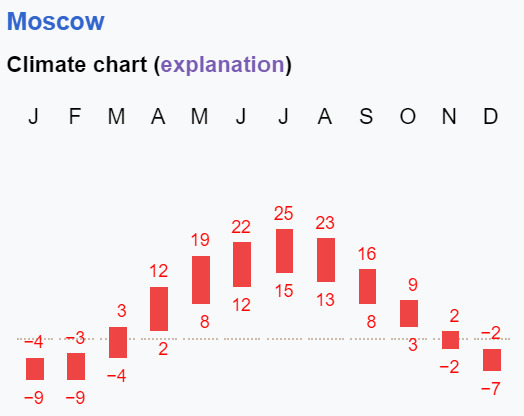
The temperature changes quite a lot throughout the year. Note that the maximum temperatures (summer) will occur at the opposite times of the year in the Southern Hemisphere.
You can see this demonstrated in Copiapo (Chile):

This city is in the Southern hemisphere, so their coldest months are June and July :)
One thing you may have noticed is that the bars here are taller, which means that the variation for the daily min and max are higher too. Why is that? I'm simplifying it a bit, but generally, the dryer a place is, the more variation you will get in daily temperature. Which brings us to the next thing to consider:
Humidity/Precipitation
There are a few things to consider:
Rainfall. This can vary month-by-month, and due to some complicated factors, some countries have more rain in their colder months, some have more rain in their warmer months. Some places don't follow a neat pattern or stay consistent throughout the year. Have a look at climate pages on Wikipedia to get some ideas! Even just this page on Chile has a lot of cool examples. Each city is quite different!
Although of course the "wetness" of a country related to rainfall (e.g. you'd expect greener grass somewhere with more rainfall, brownish dry grass or a desert somewhere with less rainfall), it's not that simple. UK is a wet country, right? And if you've heard of Gold Coast (Australia) it seems pretty dry, right? Well, actually the Gold Coast gets twice as much precipitation (rain) as London!
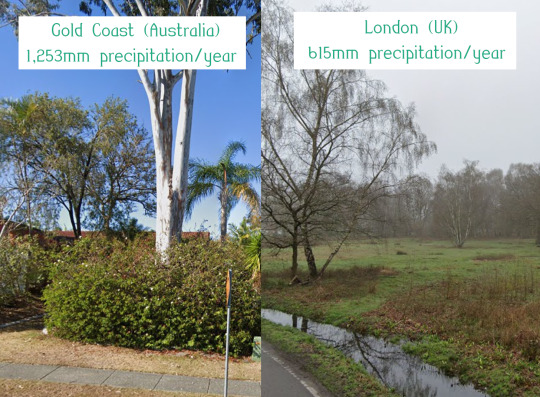
To demonstrate, I took a screenshot (randomly selected street in each city) from Google Streetview.
Why this difference? I suspect it's because the Gold Coast is much hotter. Living in Australia, puddles are normally gone by the next day (often the rain even evaporates as it hits the ground!), but in UK, the puddles would always stay around for a while.
The UK is always mossy, often the clouds hang in the sky for ages. It can look quite grey. When it rains in the Gold Coast in summer, the raindrops evaporate as soon as they hit the pavement, which makes the air feel very humid and smell strongly of rain. You can use these sorts of sensory details in your stories :)
Also, one thing I noticed, is that in hotter weather, rain can be much more heavy than in colder weather. In Australia we often get heavy rain that causes flooding. In UK the rain usually dribbles all day but doesn't get heavy. In a place like the Gold Coast you can get rain that last 10 minutes but soaks you all the way through and floods the street.
The rainfall may also vary year-by-year. Australia goes through periods of floods and droughts that last a couple of years. The mechanism is a bit complicated so I won't go through it now, but it gives you something to google!
Humidity: Deserts have low humidity, which means that you can cool off more easily in the shade and the nights are colder. The breeze feels more refreshing at low humidity as your sweat evaporates.
High humidity (like Singapore) will feel much hotter at the same temperatures and it is normally still quite hot in the shade. High humidity feels really muggy, the air feels thick. The sweat doesn't evaporate as much, so you are left all wet and sticky. The breeze can feel much less refreshing because of this.
When the temperature is below freezing, the humidity gets very low, so your skin may need more moisturiser or your lips may crack.
Those are just some things to consider while describing your weather!
Generally, closer to the sea will be wetter, further inland is dryer. Have a look at some climate maps on Wikipedia, you will learn a lot! Climate is quite complicated since there are so many factors, so there's a lot you can do with it.
UV: This is one thing that people often forget about when they think about weather. In the UK, even on a very hot and sunny day, you are unlikely to get sunburnt (unless you are very pale). In Australia, you can get sunburnt very easily in even Tasmania, which is our coldest state, even when the temperatures are chilly.
You can't actually feel being sunburnt, which I fully understood when I visited Tasmania. I was freezing, but the whole time I was being sunburnt.
Normally, UV index is higher closer to the equator, which is why people who live closer to the equator tend to have darker skin. The melanin acts as protection against the sun. Still, this protection isn't perfect, so in the real world people in Africa used different methods to protect their skin, such as using clay as a "sunscreen".
Australia has the highest rate of skin cancer in the world. This is partially because most people in Australia have pale skin (originally from the UK), but the UV index is high.
This is something to consider in your story, since it can play a bigger role in behaviour than you'd expect if you live in a cold climate. In Australia, they recommend staying indoors between certain hours of the day to avoid sunburn, and if you do go out you should wear clothes that cover your skin, a wide-brimmed hat and sunscreen. Someone with very pale skin can get sunburnt in minutes. Wide-brimmed hats are compulsory at schools in Australia - you are not allowed to play if you forget your hat.
In low-UV areas, there is the opposite issue. People with darker skin can have problems getting vitamin D. Same goes for people who cover their skin with clothing (e.g. for religious reasons). However, this is a bit simpler to fix with some vitamin D supplements.
How do I use this for worldbuilding?
If you have a map of your countries, you may want to keep their location in mind when deciding on the climate :)
I like to draw up some graphs with the temperatures throughout the year for each country and some quick notes on the humidity, rainfall and UV.
You can also add some other elements to your story. Is it a fantasy? Maybe magic affects the weather! Sci-fi? You can play with the distance of the planet from the sun, axial tilt, sun size etc. (I won't go into that since it's a whole another topic and really complicated as well)
You probably don't need to know the exact details of the climate for most stories, but having a general idea will allow you to consistently describe what sorts of clothing your characters wear, the weather etc. Those are the sorts of things that comes up in almost every story (if it's long enough).
If you read this and found this useful, please reblog so I know that it was helpful. If it seems like people enjoyed this post, I will make more (I was going to talk about so much more, but this is already too long).
#writeblr#writeblr community#creative writing#world building#writing tips#writing resources#writing advice#how to write#fantasy#science fiction#climate#writing#novel writing#comic writing#worldbuilding#fantasy worldbuilding#fantasy world#writing community#writer stuff
178 notes
·
View notes